Long time readers of the blog will remember a video that I posted before of a Mass said by the Franciscans of the Immaculate. View that video.
Long time readers of the blog will remember a video that I posted before of a Mass said by the Franciscans of the Immaculate. View that video.
The beheading of St. John Baptist, who was put to death by Herod about the feast of Easter. However, his solemn commemoration takes place today, when his venerable head was found for the second time. It was afterwards solemnly carried to Rome, where it is kept in the church of St. Sylvester, near the Campus Martius, and honoured by the people with the greatest devotion.For information on this feastday, please see my post entitled Martyrdom of St. John the Baptist.
Source: pre-1960 Martyrology
In the Office for the Dead throughout the year | |
| Oratio Orémus. Deus, qui inter apostólicos sacerdótes fámulos tuos pontificáli seu sacerdotáli fecísti dignitáte vigére : præsta, quæsumus ; ut eórum quoque perpétuo aggregéntur consórtio. | Collect Let us pray. O God, who didst cause thy servants, for whom we pray, to enjoy the dignity of the priesthood, and some to be bishops, after the order of thine Apostles : grant unto them, we beseech thee, finally to rejoice in the company of those Saints in heaven whose ministry they did sometime share on earth. |
| Deus, véniæ largítor et humánæ salútis amátor : quæsumus cleméntiam tuam ; ut nostræ congregatiónis fratres, propínquos et benefactóres, qui ex hoc sæculo transiérunt, beáta María semper Vírgine intercedénte cum ómnibus Sanctis tuis, ad perpétuæ beatitúdinis consórtium perveníre concédas. | O God, who desirest not the death of a sinner but rather that all mankind should be saved : we beseech thee mercifully to grant that the brethren, kinsfolk, and benefactors of our congregation, who have passed out of this world, may by the intercession of blessed Mary Ever-Virgin and of all thy Saints come to enjoy with them everlasting blessedness. |
| Fidélium, Deus, ómnium cónditor et redémptor, animábus famulórum famularúmque tuárum remissiónem cunctórum tríbue peccatórum : ut indulgéntiam, quam semper optavérunt, piis supplicatiónibus consequántur : Qui vivis et regnas cum Deo Patre in unitáte Spíritus Sancti Deus, per ómnia sæcula sæculórum. R. Amen. | O God, the Creator and Redeemer of all them that believe : grant unto the souls of thy servants and handmaidens the remission of all their sins ; that as they have ever desired thy merciful pardon, so by the supplications of their brethren they may receive the same. Who livest and reignest with the Father, in the unity of the Holy Ghost, ever one God, world without end. R. Amen. |
Double (1955 Calendar): August 28
At Hippo in Africa, the birthday of St. Augustine, bishop and famous doctor of the Church. Converted and baptized by the blessed bishop Ambrose, he defended the Catholic faith with the greatest zeal against the Manicheans and other heretics, and after having sustained many other labours for the Church of God, he went to his reward in heaven. His relics, owing to the invasion of barbarians, were first brought from his own city into Sardinia, and afterwards taken by Luitprand, king of the Lombards, to Pavia, where they were deposited with due honours.
Traditional Matins Reading:
Augustine was born at Tagaste in Africa of noble parents. As a child he was so apt in learning that in a short time he far surpassed in know ledge all those of his own age. When he was a young man he went to Carthage where he fell into the Manichæan heresy. Later on, he journeyed to Rome, and was sent thence to Milan to teach rhetoric. Having frequently listened to the teaching of Ambrose the bishop, he was through his influence inflamed with a desire of the Catholic faith and was baptized by him at the age of thirty-three. On his return to Africa, as his holy life was in keeping with his religion, Valerius the bishop, who was then renowned for his sanctity, ordained him priest. It was at this time that he founded a religious community with whom he lived, sharing their food, and dress, and training them with the utmost care in the rules of apostolic life and teaching. The Manichæan heresy was then growing very strong: he opposed it with great vigour and refuted one of its leaders named Fortunatus.
Valerius perceiving Augustine’s great piety made him his coadjutor in the bishopric. He was always most humble and most temperate. His clothing and his bed were of the simplest kind: he kept a frugal table, which was always seasoned by reading or holy conversation. Such was his loving kindness to the poor, that when he had no other resource, he broke up the sacred vessels, for their relief. He avoided all intercourse and conversation with women, even with his sister and his niece, for he used to say that though such near relatives could not give rise to any suspicion, yet might the women who came to visit them. Never, except when seriously ill, did he omit preaching the word of God. He pursued heretics unremittingly both in public disputations and in his writings, never allowing them to take foothold anywhere; and by these means he almost entirely freed Africa from the Manichees, Donatists and other heretics.
His numerous works are full of piety, deep wisdom and eloquence, and throw the greatest light on Christian doctrine, so that he is the great master and guide of all those who later on reduced theological teaching to method. 'While the Vandals were devastating Africa, and Hippo had been besieged by them for three months, Augustine was seized with a fever. When he perceived that his death was at hand, he had the penitential psalms of David placed before him, and used to read them with an abundance of tears. He was accustomed to say that no one, even though not conscious to himself of any sin, ought to be presumptuous enough to die without repentance. He was in full posses sion of his faculties and intent on prayer to the end. After exhorting his brethren who were around him, to charity, piety and the practice of every virtue, he passed to heaven, having lived seventy-six years, and thirty-six as bishop. His body was first of all taken to Sardinia, afterwards Luitprand, king of the Lombards, translated it to Pavia, where it was honourably entombed.
My Lord God, even now resignedly and willingly, I accept at Thy hand, with all its anxieties, pains, and sufferings, whatever kind of death it shall please Thee to be mine.
By a decree of the Congregation of Indulgences of 9 March 1904, His Holiness Pope Pius X, has granted a plenary indulgence at the moment of death to all the faithful who, on any day they may choose, will receive the sacraments of Penance and Holy Eucharist and make this act for the love of God
A video that is accurate for the most part although please note that some parts (e.g. the usage of the term "Extraordinary Ministers of the Eucharist") are inaccurate.
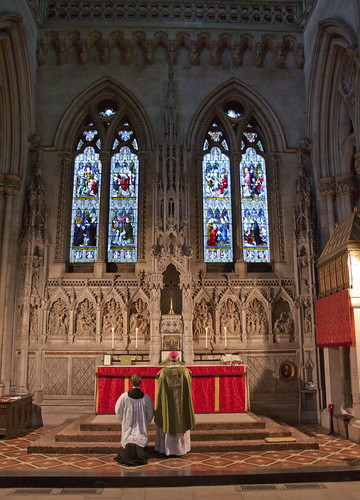
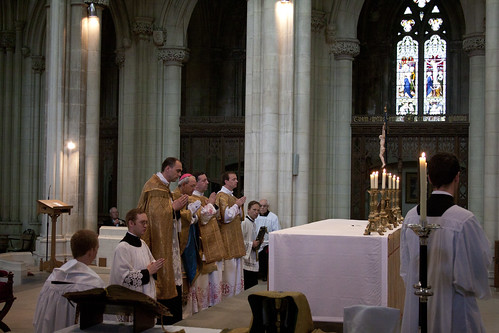
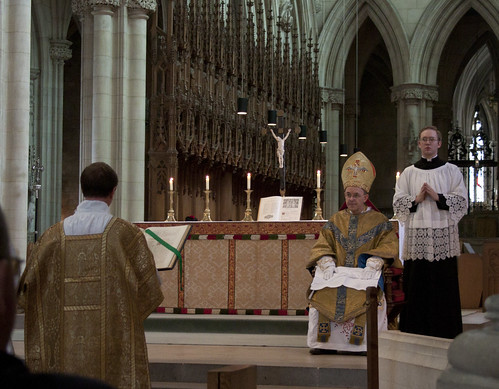
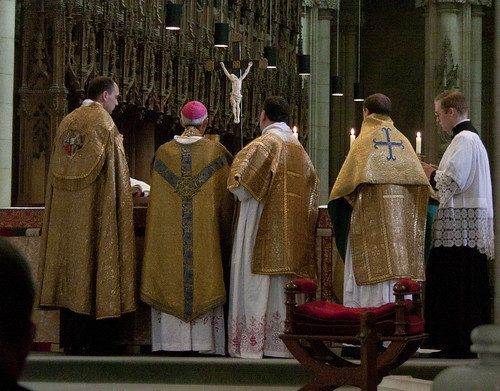
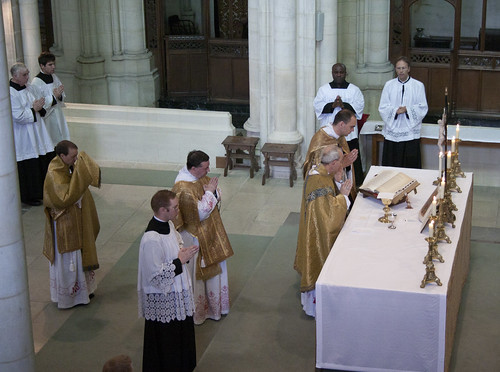
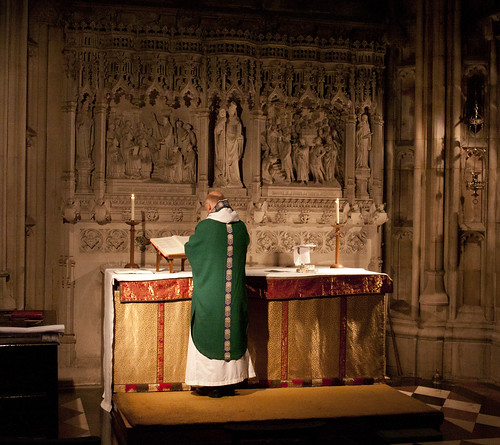
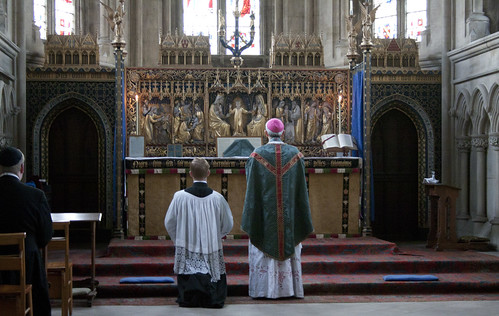
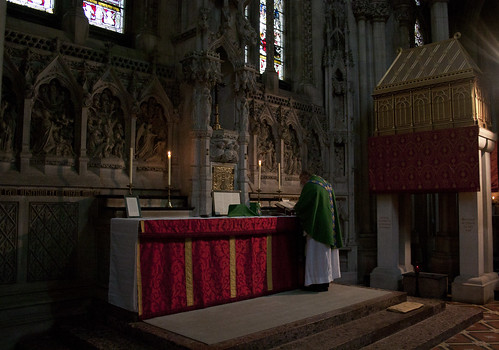
In the Office for the Dead throughout the year | |
| Oratio Orémus. Deus, qui inter apostólicos sacerdótes fámulos tuos pontificáli seu sacerdotáli fecísti dignitáte vigére : præsta, quæsumus ; ut eórum quoque perpétuo aggregéntur consórtio. | Collect Let us pray. O God, who didst cause thy servants, for whom we pray, to enjoy the dignity of the priesthood, and some to be bishops, after the order of thine Apostles : grant unto them, we beseech thee, finally to rejoice in the company of those Saints in heaven whose ministry they did sometime share on earth. |
| Deus, véniæ largítor et humánæ salútis amátor : quæsumus cleméntiam tuam ; ut nostræ congregatiónis fratres, propínquos et benefactóres, qui ex hoc sæculo transiérunt, beáta María semper Vírgine intercedénte cum ómnibus Sanctis tuis, ad perpétuæ beatitúdinis consórtium perveníre concédas. | O God, who desirest not the death of a sinner but rather that all mankind should be saved : we beseech thee mercifully to grant that the brethren, kinsfolk, and benefactors of our congregation, who have passed out of this world, may by the intercession of blessed Mary Ever-Virgin and of all thy Saints come to enjoy with them everlasting blessedness. |
| Fidélium, Deus, ómnium cónditor et redémptor, animábus famulórum famularúmque tuárum remissiónem cunctórum tríbue peccatórum : ut indulgéntiam, quam semper optavérunt, piis supplicatiónibus consequántur : Qui vivis et regnas cum Deo Patre in unitáte Spíritus Sancti Deus, per ómnia sæcula sæculórum. R. Amen. | O God, the Creator and Redeemer of all them that believe : grant unto the souls of thy servants and handmaidens the remission of all their sins ; that as they have ever desired thy merciful pardon, so by the supplications of their brethren they may receive the same. Who livest and reignest with the Father, in the unity of the Holy Ghost, ever one God, world without end. R. Amen. |
Disclosure of Material Connection: Some of the links on this blog are “affiliate links.” This means if you click on the link and purchase the item, I will receive an affiliate commission. As an Amazon Associate, for instance, I earn a small commission from qualifying purchases made by those who click on the Amazon affiliate links included on this website. I am disclosing this in accordance with the Federal Trade Commission’s 16 CFR, Part 255: “Guides Concerning the Use of Endorsements and Testimonials in Advertising.”
Support A Catholic Life. Your Patronage Helps Keep Us Updated and Online!
Become a Patron! Support Me On Patreon And Get Access to Exclusive Content, Free Catholic Books, Access to Discounts, and Much More!











